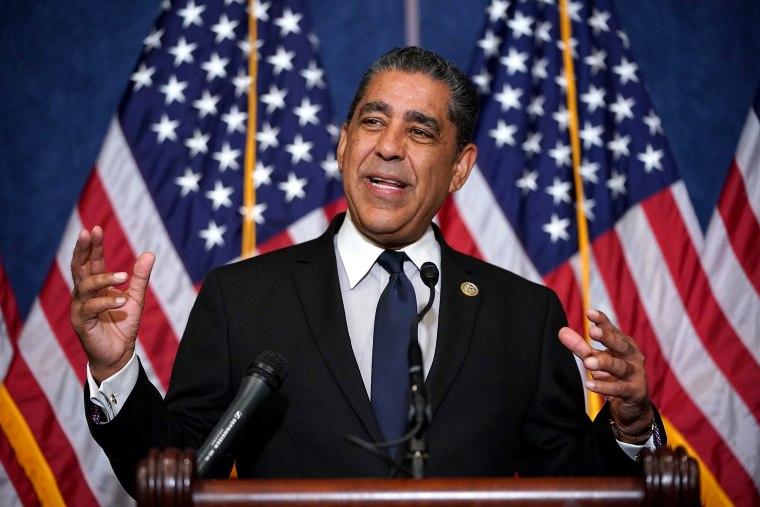WASHINGTON — New York City resident Dominga de los Santos, who has held a variety of jobs including as a housekeeper and a factory worker, came to Capitol Hill with a list of concerns.
“Is the government going to shut down again? What’s going to happen with immigration legislation and funding for education?” she told NBC News.
De los Santos was one of several hundred from all walks of life who traveled from cities around the country to participate in the first-ever Dominicans on the Hill day, which took place Thursday.
The day allowed Dominican-Americans to be briefed through panel discussions on various issues and meet with House and Senate members who stopped by their gathering.
Dominicans on the Hill was organized by Rep. Adriano Espaillat, D-N.Y., who in 2016 became the first Dominican-American elected to the U.S. Congress.
Dominicans in the United States are among the fastest-growing groups in the country, having more than tripled in population since 1990, from 517,000 to almost 2 million, becoming the country’s fifth-largest Latino group.
According to the Migration Policy Center, the largest number of Dominicans outside of the Dominican Republic live in the U.S. Additionally, more than half of the Dominicans living in the U.S. were not born in the country, compared to 35 percent of Latinos overall.
“Dominicans across the nation need to engage in the body politic and this allows them to discuss issues that are relevant to the community — Census, health care, small business, education ... it’s a young community, and we want our children to get the best education possible,” Espaillat said.
Like other Latino groups, Dominicans are younger than the U.S. population, with a median age of 28 compared to 37 for the general population. As their numbers have grown, so have efforts to increase the population's political engagement, including working to have more Dominicans in elected office.
“I think it’s hard when there aren’t that many people who look like you around, especially in politics," John Brian Canela, who works in the cybersecurity industry, said. Born and raised in the U.S. by Dominican immigrant parents, he said that a trip to Capitol Hill is an important journey for young people.
"It’s making sure our voice is represented in politics, making sure we have proper funding for educational opportunity programs, for STEM programs,” he said.
Daisy Báez, a former member of the Florida House of Representatives and a founder of the nonprofit Dominican Health Care Association of Florida, said she considered coming to Washington worth the effort to further help her local community.
“Yes, it’s expensive to come here, for plane tickets and hotels and all that, but it’s an investment because (people) need to come and see how government works, and they need to come and network and meet people, and come and learn about agencies and the services that they offer," Báez said.
Most Dominicans and Dominican-Americans are concentrated in several large East Coast cities, most notably in New York, New Jersey, Florida and Massachusetts.
In New York City, the Dominican population has grown so rapidly that it surpasses the Puerto Rican population. The Center for Latin American, Caribbean and Latino Studies at the City University of New York estimates that the number of Dominicans living in the city in 2013 — the most recent figures available from the Census Bureau’s American Community Survey — showed 747,000 Dominicans and 714,000 Puerto Ricans.
Other areas across the country have seen a growth in the Dominican population. The nonprofit group Dominicanos USA reports that there are 99,000 Dominicans in Pennsylvania, almost 20,000 in Texas, more than 25,000 in Georgia, about 17,000 in California and a little more than 10,000 in Ohio.
Fe Florimo is a Dominican resident of New York City and came to the lobby day with an agenda that included more money for young people and a plea for immigration reform.
"This country is about opportunity regardless of who you are," she said.
Aside from Rep. Adriano Espaillat, Dominicans have made inroads in politics, business and academia, including Angel Taveras, the former high-profile mayor of Providence, Rhode Island. Taveras steered the city during financial difficulties and was praised for his award-winning early language program.
For some of those who attended, it was a way to take stock of their growing clout.
“There are so many of us doing different things in different entities," said Melissa Baralt, a professor at Berkeley College in New Jersey and the daughter of Dominican immigrants.
"It's important to maintain the focus and remember that we are an important component of the fabric that is immigration in the United States of America," she said. "Especially in the current political climate, it’s important to have our voice be heard," she said.
FOLLOW NBC LATINO ON FACEBOOK, TWITTER AND INSTAGRAM.
